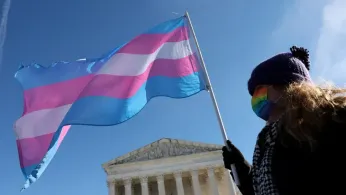
3 hours ago
Trump Administration Bans Gender-Affirming Care Coverage for Federal Employees, Drawing Widespread Condemnation
READ TIME: 3 MIN.
Last week, the U.S. Office of Personnel Management’s Healthcare and Insurance division issued an internal letter announcing a sweeping policy change: the Federal Employee Health Benefits (FEHB) and Postal Service Health Benefits (PSHB) programs will no longer cover gender-affirming care of any kind, regardless of age, starting in 2026. The letter, signed by division director D. Shane Stevens, specified that “chemical and surgical modification of an individual's sex traits through medical interventions (to include 'gender transition' services) will no longer be covered under the FEHB or PSHB programs ... regardless of age” .
The policy follows a series of executive actions from President Trump’s administration targeting access to gender-affirming care. On January 28, 2025, President Trump signed Executive Order 14187, titled “Protecting Children from Chemical and Surgical Mutilation,” which directed federal agencies to restrict all forms of gender-affirming care for individuals under 19 and to “immediately take appropriate steps to ensure that institutions receiving” federal grants do not provide gender-affirming care to minors .
The order defined gender-affirming care broadly, encompassing puberty blockers, hormone therapy, and surgical interventions, and directed federal health insurance programs—including those covering millions of employees and their families—to exclude these services from coverage .
Subsequent guidance from the Department of Health and Human Services (HHS) confirmed the administration’s intent to reinterpret sex discrimination protections in federal law, removing explicit reference to sexual orientation and gender identity, and signaling further rollbacks of LGBTQ+ health protections nationwide .
LGBTQ+ advocacy and legal organizations moved quickly to condemn the federal government’s action. Lambda Legal, a national civil rights organization, called the exclusion “not only cruel—it is illegal,” arguing that the move violates the equal protection guarantees of the U.S. Constitution as well as multiple federal laws, including Title VII of the Civil Rights Act and Section 1557 of the Affordable Care Act .
“These discriminatory policies denying medical care to government employees and their dependents are unlawful. The federal government cannot simply strip away essential healthcare coverage from transgender employees while providing comprehensive medical care to all other federal workers,” said Omar Gonzalez-Pagan, Lambda Legal’s Counsel and Health Care Strategist. He referenced the Supreme Court’s 2020 decision in Bostock v. Clayton County, which confirmed that employment discrimination on the basis of gender identity is prohibited under federal law .
State officials have also begun to challenge the policy. On August 1, 2025, New York Attorney General Letitia James announced a lawsuit to block what she described as “unlawful attacks on gender-affirming care,” arguing that the administration’s actions are not backed by any federal statute and are designed to intimidate providers and suppress access to medically necessary care .
Every major U.S. medical association—including the American Medical Association, American Academy of Pediatrics, and American Psychiatric Association—recognizes gender-affirming care as safe, effective, and often lifesaving treatment for transgender people experiencing gender dysphoria . These organizations warn that denying access to such care increases risks of depression, anxiety, and suicide among transgender individuals .
The new federal policy, however, rejects this medical consensus, instead echoing language used in the executive orders that conflates gender-affirming care with “mutilation” and “gender ideology,” terminology that medical professionals have denounced as inflammatory and misleading .
The FEHB and PSHB programs provide health insurance to more than 8 million federal employees, retirees, and their dependents, including thousands of transgender people and families with transgender children or adults . Advocacy organizations warn that stripping gender-affirming care from these plans will have profound consequences, not only for access to medically necessary care but also for the economic security and psychological well-being of affected workers.
Human Rights Watch has previously documented how bans on gender-affirming care, even at the state level, have led to increased hardship for transgender people and their families, including forced delays in treatment, financial strain, and heightened exposure to anti-LGBTQ+ discrimination .
Legal experts anticipate significant litigation in response to the policy, as organizations like Lambda Legal, the American Civil Liberties Union, and the National Center for Lesbian Rights prepare to challenge the exclusions in federal court. The lawsuits are expected to focus on violations of constitutional equal protection and federal anti-discrimination statutes, as well as the medical necessity of gender-affirming care .
In the meantime, LGBTQ+ advocates urge federal workers and their families who may be affected to seek out legal resources and support, including through organizations like Lambda Legal, which has established a help desk for impacted individuals (https://lambdalegal.org/helpdesk/).
As the nation’s largest employer moves to strip away essential healthcare protections for transgender people and their loved ones, the outcome of this policy—and the legal fight it has triggered—will have far-reaching implications for LGBTQ+ rights and healthcare equity nationwide.






